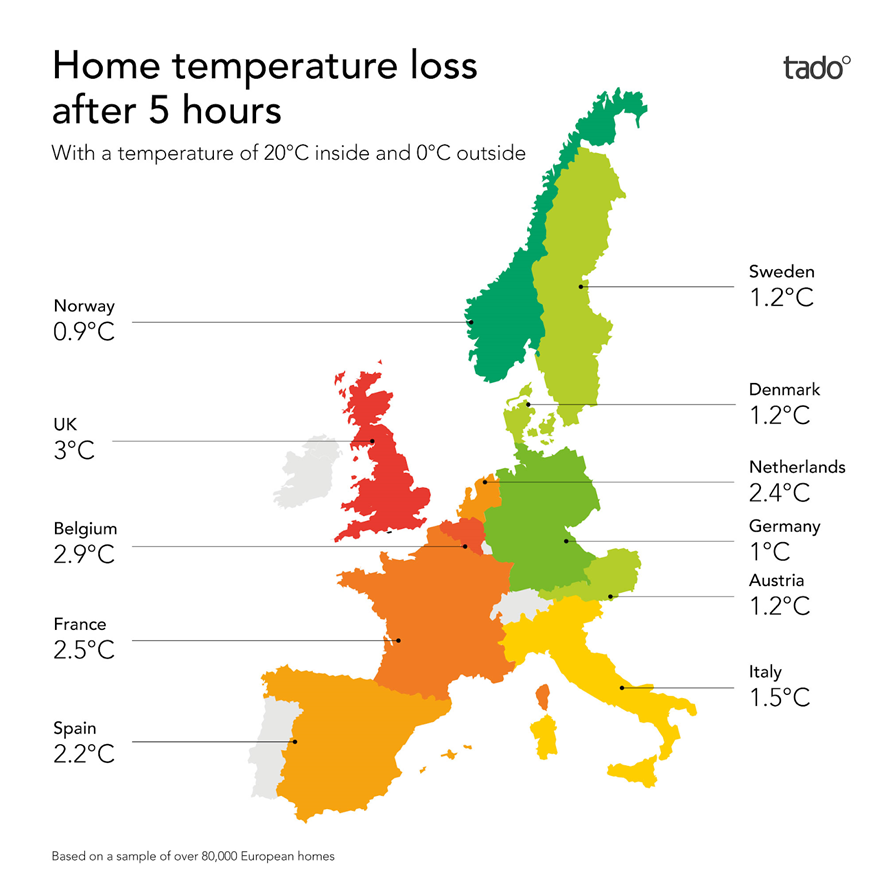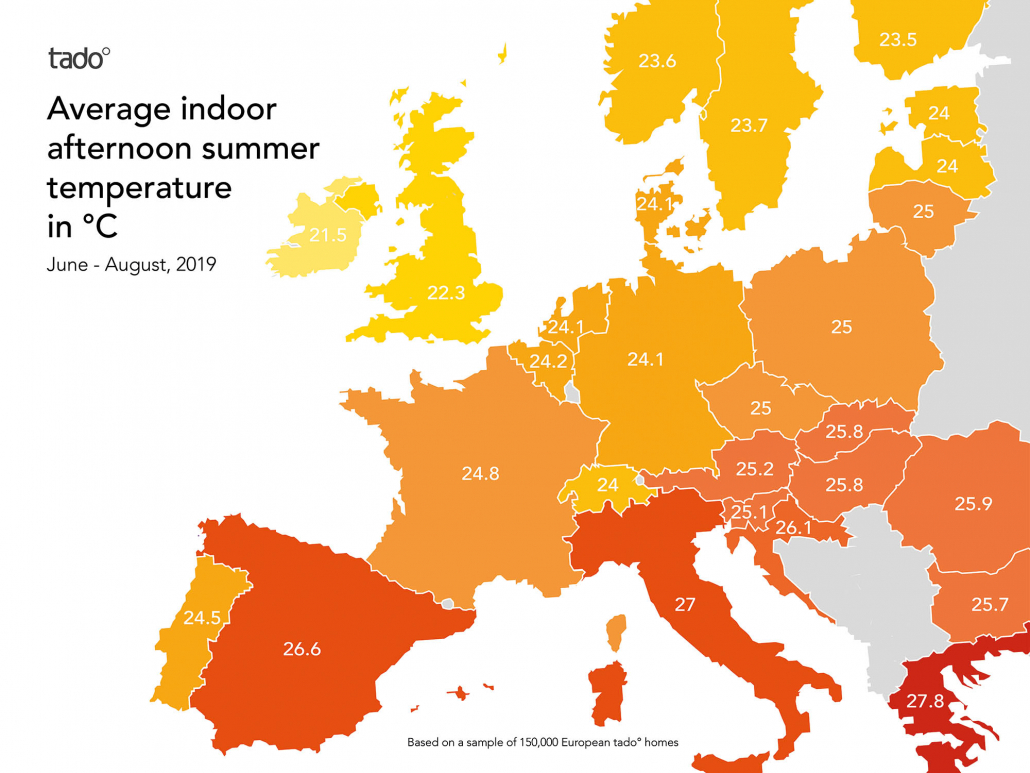
Hello, Habr! I am Daria Voronova, founder and CEO of Domiland. Our platform is directly related to utilities, so I decided to discuss housing, not only in the Russian Federation, but also in the world. In different countries, the conditions for the provision of these services are very different from each other, and somewhere the "communal apartment" is almost free, and somewhere it stands like a cast-iron bridge.
In the material, we will consider issues related to heating, the cost of communal services and the features of housing and communal services in different regions. Of course, the article will not be able to fit all the information at all, so I propose to consider this material as a reason for discussion. By the way, many of Habr's readers live in other countries, and in the comments I would like to discuss together what they like in housing and communal services, what they don't, and how much it costs. Well, let's get started!
Is it warm or cold in Europe?
We know what happens to heating in Russia during the cold season. In general, everything is more or less bearable. Somewhere the temperature is almost ideal, somewhere the utilities turn on the heating at full capacity, so even at -40 degrees outside the window, this very window has to be opened. Well, somewhere organizations approach the heating season unprepared, so they have to urgently repair the heating system that has leaked out over the spring and summer.
What about Europe? In general, the communal infrastructure is working well here. But - in most countries, central heating is absent, partially or completely. For our compatriots who find themselves in the West, the need to install electrical or other heating devices often comes as a surprise. But what is the normal temperature?
Residents are used to relying on companies that supply thermostats and collect temperature data in customers' homes for this matter. One such company is Tado. She publishes interesting graphs and statistics every year.
For example, according to Tado, it turns out that the richer a European country is, the lower the temperature in the apartments of local residents in winter. Below is the data for 2019.
As you can see, in general, everything is not bad. And what's even more interesting is that the situation is clearly better than in 2016 (maybe it was just abnormally cold?). Below is a screenshot of a similar message from the same company for 2016.

What about thermal insulation? How quickly does heat leave houses and apartments if the heating is turned off? The picture is very interesting - it looks like the thermal insulation of premises in the Netherlands, Belgium, France and Great Britain is nowhere worse. Here is the statistics of the temperature drop for 5 hours after the heating was turned off.

The worst of all is in Great Britain. And best of all - in Norway. Apparently, the life of the whole family depends on the insulation of the house there (let's exaggerate a little, yes), because the country is located in a cold zone.
Okay, but what about the temperature in summer? Everything is more logical here - the warmer the country, the higher the temperature in the apartment at noon.

In Spain and Italy, they obviously do not like to turn on air conditioners in the summer. Rather, they may love it, but this is an extremely expensive pleasure - if the air conditioner works all day, then the electricity bill may well be 200-300 euros for a medium-sized apartment.
Utility tariffs
Well, now let's see how much housing and communal services cost in different countries. We managed to find data for the Netherlands, Germany, Italy, the Baltic States, Finland and the USA.
Netherlands
It is quite cool here in the apartments in winter - and no wonder, since the locals turn on the heating only if the temperature drops below + 15º C.
Hot water in this country costs a family of four about 10.2 thousand rubles a month ... Cold - 2.2 thousand rubles.
You have to pay about 3.5 thousand rubles a month for garbage collection. All kinds of telecommunications - an average of 5.9 thousand rubles and electricity - 4.2 thousand rubles. You will have to pay for gas about 3.2 thousand rubles a month.
On average, a family will need to pay 30-33 thousand rubles per month for everything related to utilities.
Germany
Here, too, consider the average family.
Heating and water supply takes about 6 thousand rubles a month from the general budget. You need to pay about 4.3 thousand rubles for electricity - of course, it all depends on the situation. If you turn on two air conditioners in summer, the bill will be much higher.
Even in Germany, you have to pay a tax on radio - about 1.2 thousand rubles a month. Moreover, it does not matter at all whether someone is listening to him or not.
Well, about 1.6-2 thousand rubles are spent on the Internet every month.
In general, the family pays about 13-15 thousand rubles a month for housing and communal services. Someone more, someone less, but the average picture is exactly like this.
Italy The
monthly water bill is about 1.2 thousand rubles. For electricity - 10-12 thousand rubles. True, this is if the room is heated with electrical appliances, which is very expensive. If not - about 3-5 thousand rubles a month.
In Italy, the tax is similar to the German one - not only on radio, but on TV. A little, 500 rubles a month, but you still have to pay.
You also need to pay for garbage disposal - about 1.5 thousand rubles, and if there is an administrator in the house (he can still be called the president), then we add 3 thousand rubles a month.
On average, a family of three in Italy pays about 16-18 thousand rubles a month for a communal apartment.
Baltics
We have data on Estonia, if any of the readers lives in Latvia or Lithuania - write down in the comments how much you pay.
So, in Estonia, about 7.3-9 thousand rubles are spent for gas, telephone and water per month. This is much less than in other European countries.
For garbage disposal - about 150 rubles a month and another 1.2-3 thousand rubles have to be paid for the maintenance of the house.
On average, a family pays for housing services from 9 to 12 thousand rubles per month.
Finland
Here, too, not very much turns out. An exception is the use of gas. If there is gas heating, then about 11 thousand rubles a month are spent on it.
For light a little less - 2.7-5 thousand rubles. By the way, Finland is one of the few countries where there is central heating (not everywhere). You need to pay about 8-9 thousand rubles a month for it. For water - 2 thousand rubles, housekeeping - 500 rubles a month. Well, telecommunications - 2.1 thousand rubles.
It turns out 14-18 thousand rubles a month, depending on the size of the family.
Spain A
family of four pays about 1,500 rubles a month for water, 5-6 thousand rubles for electricity, about 9 thousand for telecommunications (cable Internet, two SIM cards, television).
Heating in the winter months costs about 3,000 rubles a month - this is if you use a special stove designed for heating with gas cylinders. It is enough to heat a 2-3 room apartment. If the apartment is larger, and an electric heater is also used, then it turns out about 7 thousand rubles a month.
As a rule, the owner of the rented apartment pays for the maintenance of the house, not the tenant, but the amounts there are not very large - 500-1000 rubles per month.
As a result, about 15-20 thousand rubles per month are spent per month.
USA
The same family of three pays about 5,000 rubles a month for water. For gas in winter - about 6,000 per month, for electricity - 7-15 thousand rubles per month. In summer, you get much more for electricity if you live in a warm region.
Telecommunications cost 8-9 thousand rubles. There is also a home insurance service, which costs about 10 thousand rubles.
Such a family pays about 25-35 thousand rubles a month. In America, the state and the city where people live are of great importance.
Some interesting facts about housing and communal services
This section is the smallest, we have collected a few facts about the peculiarities of the work of utilities in different countries.
- , . , -.
- — , . , «» , «» — .
- , . — . .
- — , .
- USA - very accurate accounting of the consumed resources by utilities. Slightly wrong - the court.
- South Korea. Despite the rich cultural and technological life of this country, there are no special differences in the use of housing and communal services. Attention can only be paid to centralized heating. So, South Koreans use gas and electricity. The latter is turned off during the daytime and in summer. As for gas, it costs much more than its counterpart.
In general, this is a small fraction of everything that I would like to talk about. But let's discuss the nuances of housing and communal services in your region - what are the features, how much do you pay and for what? And, perhaps, it is also worth mentioning the degree of satisfaction with housing and communal services in your country - are you satisfied or not?